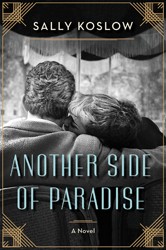The Briss opens with Teddy Ostrove, a twenty-something Jew from Winnipeg calling his parents from Ramallah to tell them that he’s volunteered as a human shield for the Palestinian cause, and that he has fallen in love with, impregnated, and proposed to a Palestinian woman he met on his Birthright-Israel-like trip. Such a fantastically volatile opening ought to have launched a book where outrageous humor only augments some degree of emotional and political substance, but The Briss is so ludicrously lopsided against Israel and takes such a uniformly scathing attitude toward its very vulgar one-dimensional Jewish characters, that it is hard to empathize with any of them despite their respective distress, or to derive any insight into the situation, whatever side of the political divide you’re on. It may well make you laugh uncomfortably though.
Teddy’s parents are crass, inept social climbers whose greatest concern is what the superficial and super-cruel suburban Jews they aspire to hobnob with will think of them, and Teddy’s divorced sister has a reputation for sleeping around with married men. The Ostroves’ feeble and ignorant pro-Israel platitudes easily get bested by Teddy’s only comparatively articulate new-found pro-Palestinian radicalism. Teddy’s latent liberalism was triggered on the trip by his having met “ugly Israelis” (American settlers) and a charismatic alpha-male sabra soldier angry about “the occupation” who schooled him in the ostensible facts about the iniquities the Palestinians suffer, and of course, by falling for his Palestinian princess at first sight. Teddy’s parents had pushed him to go to Israel and change his life, because they were humiliated first by his dropping out of medical school to become a nurse, and then by his having an affair with a lesbian rabbi’s wife.
Tregebov’s strong dialogue flows fast and funny, and the book reads more like a play than a novel, but the effect is glib and nasty from the start. The book, though strident and completely unbalanced, falls short of being propaganda, because skewering the ignorance of diaspora Jews almost seems more important to the author (who lives in Barcelona) than bashing Israel or boosting the Palestinian cause. Mrs. Ostrove tells Teddy repeatedly, “You’re taking my neshome (soul) out,” and that’s exactly how reading this book felt.




